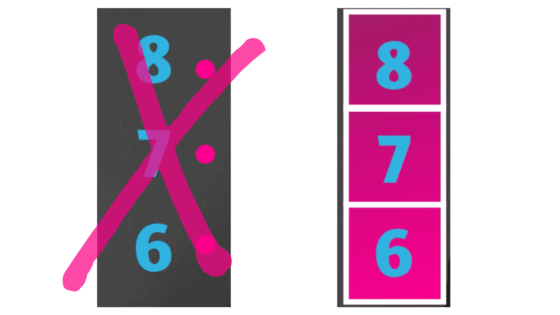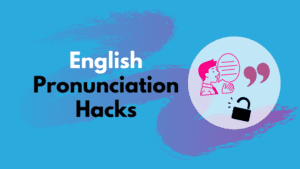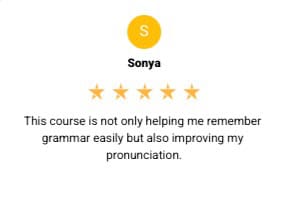Introduction
If you have taken the IELTS Speaking Test a few times and you keep getting a Band 6 or a Band 6.5, you may be feeling frustrated. You may feel you are stuck and there is no way to move up to a Band 7.
Don’t worry, so long as you know where and why you are stuck, then you can start to get ‘unstuck’ and move up to a Band 7.
In this article, I will show you what might be keeping you stuck and how to move up.
What you will learn
Why you are stuck at IELTS Speaking Band 6
First of all, understand that the IELTS bands are not points, they are spaces.
So IELTS Speaking Band 6 is not a point, it actually covers different levels. So, there are weaker and stronger Band 6 students, within this level.
So you may be at the bottom of the Band 6 ‘band ‘ or ‘space’. Or you could be at the top end.
If you are at the bottom end, basically you need to focus a lot more on improving your overall English skills. Exam practice and tips is not enough to take you to a band 7.
I would almost advise you to leave IELTS for a month or two and just study general English.
No pressure, just learn to enjoy English again.
You can use the advice below on the right tools, and right study method to help you. If you want you can try following my free live lessons every week, to learn English in a fun and professional way.
If you are at the top level of Band 6, a ‘strong’ band 6, it may be that all you need is to do some exam practice and pick up some tips to ‘push’ you up to a Band 7.

The Right Study Tools
I would suggest just having a handful of tools to help you study and practice your speaking skills for IELTS.
Otherwise, you risk getting distracted, lost and overwhelmed.
I suggest one ‘go-to’ website, a good grammar reference book, an advanced vocabulary book and a mobile app.
Recommended Website: Keith Speaking Academy 😆
Recommended Grammar Book: English Grammar in Use (Raymond Murphy)
Recommended Vocabulary Book: English Vocabulary in Use – Upper Intermediate (McCarthy and O’Dell)
Recommended Mobile App:Woodpecker Learning
Good Study Habits
James Clear suggests that a good study habit starts with a cue.
This can be a time.
So you can best create a good study habit, if you choose the same time everyday to study.
Maybe this is 7am in the morning, before breakfast, or at 12pm just before lunch.
Whenever it is, fix it and have this as your CUE.
Your cue could also be a place. So maybe you have a chair or favourite coffee where you always study English.
We are the sum of our habits. All the little things we do each day, add up to our life. So create good study habits, and you will become a successful language learner.
Also, I think it is really important to enjoy your learning. Research tells us, the more relaxed we are, the better we learn. Simple as that. Find ways to study things you like and that you enjoy learning.
Finally, be focussed.
Don’t let yourself be distracted by people with their own agenda, by Facebook, by email, and too many study books.
Be focused and you will learn more effectively.

Improve your Fluency - The Fridge Technique
There is a memory game we played as children called ‘In my fridge there is…’.
You say one item in your fridge and then the next person repeats and adds an item, and so on.
We can apply this technique to improving our fluency. Take a simple question:
Where are you from?
You can then answer with one phrase. Then repeat it and add another phrase. Then repeat it all and add another phrase.
3 to 4 phrases is enough.
This is powerful technique to build fluency and confidence.
For example, you might answer
I am from Manchester
I am from Manchester which is in the north of England
I am from Manchester which is in the north of England a beautiful part of the country by the way
Improve your Exam Technique
If you are at the top end of IELTS Speaking Band 6, a ‘strong’ Band 6, then you may want to develop your exam technique with these resources.
Get clear about the test format with information from the official IELTS website:
Understand how each part of the test works and get some tips for each section. You can get all of this here below:
Do some IELTS Speaking practice tests where you hear some questions and practice giving your own answer.
Here are some recorded mock tests. Practice one a day.
How are you feeling about your level now? Let us know in the comments below.
Together we can learn from each other and grow as a community.






15 thoughts on “IELTS Speaking from 6 to 7: Why you are stuck at Band 6”
Hi there, I got a question about the IELTS band 6 and 7 descriptors for GRA concerning the difference. As I understand it, the structures my essay should.contain are complex sentences (that is, subordinate clauses) and I’m not expected to.show.a range of other.complex structures. If I want to get a band 7 in GRA, I need to add other complex structures (complex verb patterns, modals, passives, complex noun phrases) besides the complex sentences. Am I right?
Great Blog, extremely informative and helpful. Keep up the good work !
I will – thanks for the motivation!
Hi,
Is it worth to use synonyms in speaking as I faced difficulty to think about synonyms and story creation in a short span of 1min time?
How can I improve?
Yes, synonyms can show a wider range of language, so they are really useful. Don’t worry about using them all the time, just try and practice using some in your general practice.
Hi Keith! Thank you for all you do.
I know that this article is for students who are stuck at band 6, but I would like to learn how to jump from band 5 to band 6.
I need your advice in this issue.
I am looking forward to hearing from you soon.
Thank you for your concern. 😊😊
The key focus for a band 5 definitely has to be a focus on improving your overall spoken skills. Avoid complicated language that is far above your level. Just focus on moving up to Band 6.
This will help a lot of students to avoid mistakes which they are doing in IELTS speaking and through which they don’t get more Band than 7 and stuck between the 6 to 7 Bands. After reading this students will manage some time and will gonna correct their mistakes.
Thanks for your comment – I hope the ideas can help students, as you say!
Hi Keith! I’m stuck at 6.5 in speaking and I’m really already getting frustrated about it to the point that I’m hating it already. What shall I do to change how I feel about it and where should I start all over again? I badly needed your advice.
Hi Jannelle – mindset is such an important part of test preparation. If possible, I would advise you to take a break from preparing for IELTS, and just do some fun and enjoyable English study. Then after a month or so, do a bit mpore test prep for a week or two, then go and so the test. I think this might help give you some freshness and inspiration (and help you do better in the test).
thanks a lot for your valuable recommendations.
It really is my pleasure!
Hi Keith,
thank you for all you do and for your effort to take us to the better English.
I watch every day the series The walking dead without subtitles. It´s challenging but it helps learn new vocabulary and revise the old one.
Adriana
That’s an interesting series, I have watched a few episodes – quite scary! Well done and keep building your vocabulary!